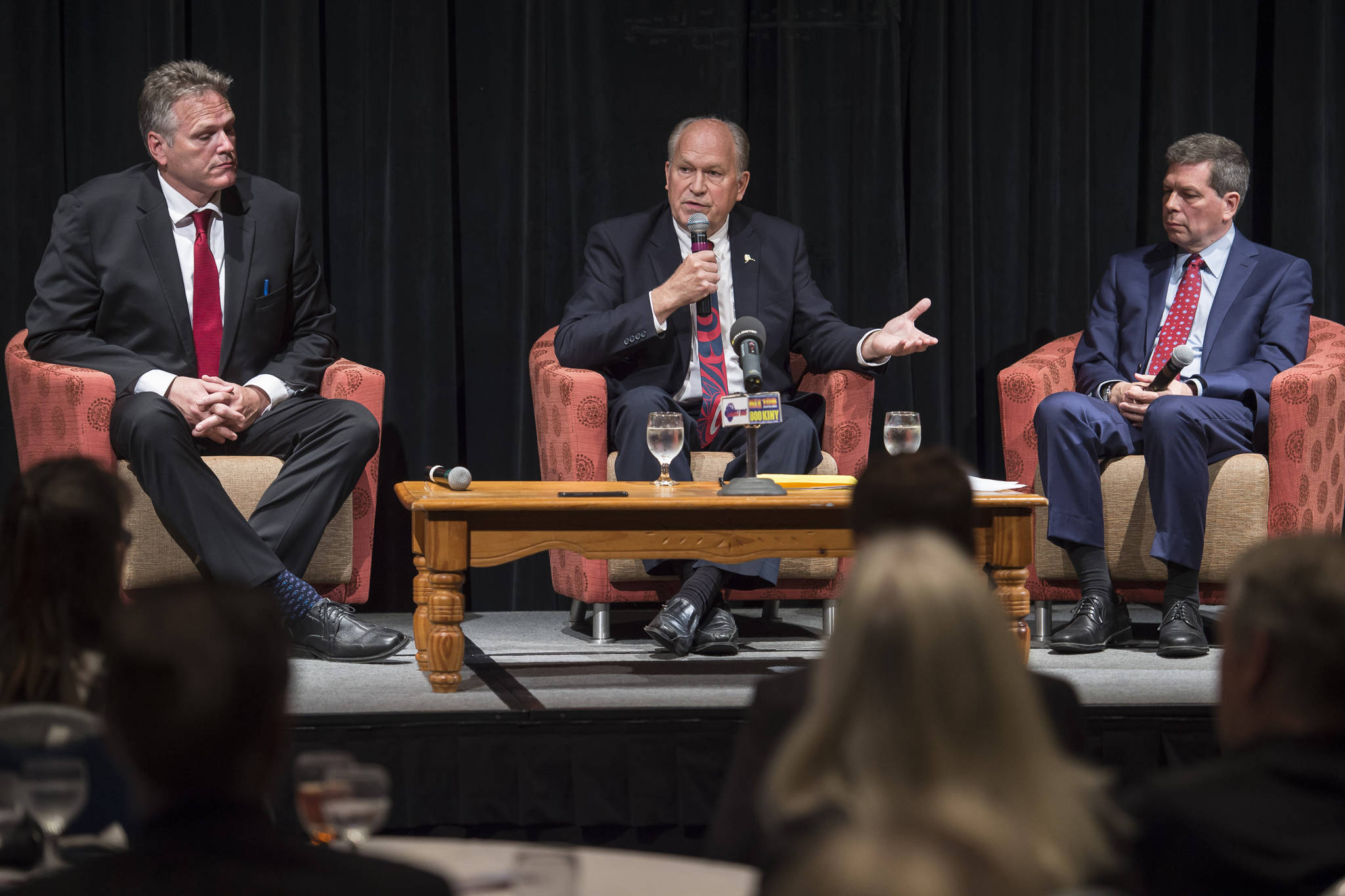Republican Mike Dunleavy has a significant lead in financial and popular support with less than one month remaining in Alaska’s four-way governor race, according to figures released this week.
Monday was the deadline for candidates in November’s general election to submit campaign finance reports to the Alaska Public Offices Commission, and Dunleavy reported having $153,597 on hand for the final month of his joint campaign with Republican Lt. Gov. candidate Kevin Meyer. Democratic candidate Mark Begich reported having $101,351, independent incumbent Gov. Bill Walker reported having $91,524 on hand, and Libertarian candidate Billy Toien reported having $678 on hand.
Dunleavy’s financial edge turns massive if independent expenditure groups are added. While contributions directly to a candidate are strictly limited under Alaska law, so-called IE groups can accept unlimited contributions. They are barred from working directly with a candidate, but they may run ads favoring or opposing candidates or issues.
The Republican Governors Association, a national group, has contributed $2.7 million to an IE group known as Families for Alaska’s Future, which has spent more than $1 million on Dunleavy’s campaign so far. Families for Alaska’s Future has more financial backing than all of the independent expenditure groups backing all other candidates combined, and it’s not the only group supporting Dunleavy.
Dunleavy for Alaska, the first independent expenditure group involved in this year’s gubernatorial election, has collected $936,547 in contributions. About a third of that total has come from Frances Dunleavy, Mike’s brother.
The group backing Walker, called Unite Alaska for Walker-Mallott, has reported just under $1 million in contributions, mostly from unions. Its largest single contributor is another group, called Working Families for Alaska, which is a shell for contributions from Laborers Local 341.
The group supporting Begich, called Begich for Alaska, has received a comparatively small $71,749 since its inception, mostly from Planned Parenthood Votes Northwest and Hawaii, which offered $50,000.
On the same day as the deadline for campaign finance reports, Alaska poller Ivan Moore released the latest in a series of polls tracking public opinion in the gubernatorial race. Dunleavy has consistently led in polling throughout the summer, and Moore’s information reveals no sign that trend has changed. According to the latest poll, which was conducted from among 500 likely voters between Oct. 1 and Oct. 6, Dunleavy has widened his lead in the race to 20 points.
Moore did not include Toien in his poll, but among the candidates that did appear, Dunleavy would receive 46.5 percent of the vote, Walker 27 percent and Begich 22.6 percent. Only 3.9 percent of respondents were undecided, and the poll had a 4.4 percent margin of error.
Publicly available polls have not been released at the statehouse level, but candidates for state legislature were subject to the same campaign finance reporting requirements as the people running for governor.
In Senate District Q, which covers northern Southeast Alaska, Democratic candidate Jesse Kiehl has $49,744 in the bank. His challenger, independent Don Etheridge, has $15,413 on hand.
In House District 33, which includes Douglas, downtown Juneau, Skagway, Haines, Gustavus and Klukwan, independent challenger Chris Dimond has $12,641 on hand and Democratic candidate Sara Hannan has $29,013 on hand.
In Mendenhall Valley’s House District 34, Democratic candidate Andi Story reported $42,531 on hand, and Republican Jerry Nankervis reported $42,185 on hand.
No incumbents are running for any of the three seats representing Juneau.
Election Day is Nov. 6, but early voting opens Oct. 22 in the State Office Building and in the Mendenhall Mall Annex.
• Contact reporter James Brooks at jbrooks@juneauempire.com or 523-2258.

